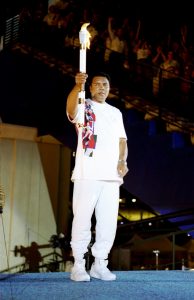Our legends are becoming ancestors.
Today, The Greatest joined their number.
#RIPMuhammadAli
Who presents this bride?
Today makes eight.
For years I went to bed early. As an elementary school teacher, I had an extensive morning routine involving exercise, prayer, and a 30-minute commute. I arrived at work by 7 a.m. – well before the kiddos who often wanted to share household news as soon as they said good morning. Because I require 7-8 hours of sleep to function well, I observed a strict bedtime of 9 p.m. My friends knew this and generally avoided calling past 8 or 8:30. From time to time an acquaintance would call too late, so I turned off my ringer at night just to play it safe.
That is, until Daddy admitted his health was fading.
It was shortly after Mama died. His prostate cancer wasn’t a secret, yet he seemed to be doing well. But y’all know how (some) men like to hide shit. Reality didn’t exactly align with appearances. I told him in no uncertain terms, he wasn’t allowed to die any time soon. His reaction, some mixture of exasperation and acquiescence, was disconcerting. He said okay because that’s what I wanted, but he hinted there were no guarantees.
I began leaving my ringer on at night.
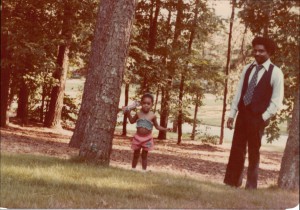
My parents eloped when they were 23. As a little girl my mother offered me several thousand dollars if I eloped, too. I can’t remember what prompted her to mention it at that moment. The only possibility that comes to mind is Princess Diana’s wedding, grand affair that it was. I was too young to have heard about the bride’s family footing the bill for weddings or other such traditions. I’m serious, she said. I shrugged. I tucked it away for later.
As a teenager I thought I’d get married shortly after college. My 20s came and went and I remained single throughout. I was grateful, honestly. I hadn’t met “Mr. Right,” and by the time I hit 30, I’d evolved into a completely different woman.
My dad did his best, as much as one can wield control over such things. He held on another three years. My phone rang just before dawn. I sighed awake, already shaking my head. No good news comes at this time of day. The voice on the other end was Daddy’s but softer in tenor. I instantly recognized my uncle, Daddy’s identical twin. Did I call at a bad time? he asked. I pressed him to spill the news. Daddy was en route to the hospital. He wasn’t breathing on his own.
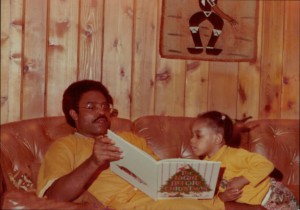
I arrived at Grady Hospital eight years ago today. I didn’t see Daddy that morning. Nor any other since. Following my uncle’s lead, we both left without seeing his lifeless body. I wanted to say goodbye, but I did not want the image of death burned into my memory. I had made that mistake with Mama.
Toward the end of my 30s, I met my future husband. When we spoke of marriage, I told him I didn’t favor a big wedding, and, in fact, eloping was fine with me. I was down for a courthouse ceremony, or a small gathering on the beach. I don’t think he believed me the first few times we discussed it, but the seed Mama planted nearly three decades earlier bore fruit. I had never planned or even considered a “fairy tale” wedding.
A few months after my 40th birthday, Blue proposed.
I remembered the brides who cried in the days leading up to their weddings. I vowed not to be one of them. As spring melted into summer, we played around with wedding dates, sizes and locations. Nearly every Friday from June through August, we considered jumping in the car and heading to the courthouse. In September we settled on an intimate October affair.
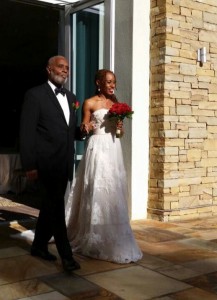 If we had eloped, we would’ve escorted each other during the ceremony. But the venue we selected encouraged something a little more traditional. I decided Daddy’s twin, my “DNA Daddy,” might be the perfect choice.
If we had eloped, we would’ve escorted each other during the ceremony. But the venue we selected encouraged something a little more traditional. I decided Daddy’s twin, my “DNA Daddy,” might be the perfect choice.
He later told me it was one of his greatest joys.
During our ceremony, we invoked ancestors and loved ones who were not present, and that, of course, included my parents. Although neither were present in body, it was a loving comfort to hear Daddy’s voice and witness his smile through his brother.
Said our officiant, Who presents this bride?
My uncle replied, I do.
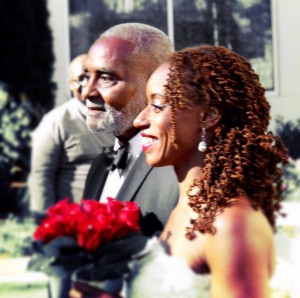
Thinking of you.

9/27/43 – 5/25/03
On ironing and grief. #NaBloPoMo #amwriting.
I remember when I stopped ironing.
As a young girl, I ironed all the time. And to some degree, ironing suited me. I’d iron shirt after shirt, and soon enough I’d be in a mindless rhythm. My thoughts were free to imagine new scenes for my current short story, or remember favorite scenes from a Judy Blume in progress. Usually I’d iron in the den on weekends. Daddy stretched out in his easy chair watching sports of some sort, momma half-watching, half-devouring a novel. It was easy, ironing was.
As I grew older, I continued ironing as needed. Didn’t think much of it. Maybe I no longer ironed clothes on weekends. Maybe I simply ironed the night before, as I laid out clothes for school.
In college, ironing happened decidedly less often. Using that mini surfboard on the bed proved neither effective nor fun, and it was college. Everyone knew you just needed to get your clothes out of the dryer while they were still warm. Ironing was reserved for the really stubborn creases, and only then at the last possible minute.
I entered the workforce and ironing again became a regular occurrence. Sometimes it was the evening before, yet more often than not, I saved it for my morning routine. There wasn’t much to it, after all. It was just ironing.
I remember when I stopped ironing.
Months after momma died unexpectedly, grief became stress became a fog. Life was thick. Heavy. Clouded over. Every morning it was time to get dressed and go teach my 4th graders, yet it got harder, not easier. Where was it? Where was the outfit I could just put on? I didn’t want to think about ironing. I couldn’t bear the thought.
I was near tears one day, trying to figure out tomorrow’s outfit and the requisite ironing, when cousin big sister suggested a radical idea: dry cleaners. I had only associated dry cleaning with my dad’s work shirts. Momma and I dropped them off early mornings before school and picked them up in the afternoons.
Neatly pressed clothes sans stress? Sign me up. I sighed away 10 pounds.
And thus marked the beginning of the end of ironing. Soon enough, through geography and professional choices, I all but eliminated the need for pressed clothes from my life. For years I donned sarongs and sundresses, jeans and fitted t-shirts.
—
As of late, the iron is no longer content to make cameos. It seems to be pushing for a more starring role. Yesterday’s sheath dress required a tap from the hotel iron, as did today’s button-down and slacks. And it was easy enough. There isn’t much to it, after all. It’s just ironing.
But I remember when I stopped ironing.
On Framing Death
Although born with breath in our bodies, at some point we exhaust our share. Our supply runs out. We draw the last one. When that fateful day happens, we die. Whether we merge into the cosmic consciousness and become one with the essence of all there is, take a mystical trip upward or downward, come to inhabit another body, or simply cease to exist, is another matter entirely. I stake no claim on knowing.
But we can say with conviction: no one continues in their current form forever.
Death is something no one can escape from. It follows life as surely as night follows day, winter follows autumn or old age follows youth. ~Ikeda
Since we arrive with the guarantee that we will also depart, I always wonder why some people frame death, especially when it is the result of an illness like cancer, as “losing.” As in, “she lost her battle with cancer.” Such wording, while meant to convey the way a loved one has died, implies they could’ve been immortal if only… They lost, as if, had events gone another way, they could have “won.” But what might winning mean? In a battle for life, death is the certain winner. So perhaps life and death are not best framed as competitors.
It is fair to acknowledge the cause of death. And of course we can acknowledge our loss; our sorrow that our loved one’s time with us was shorter than we, and perhaps they, would’ve liked. But I don’t think we give life or death their full measure when we say someone lost because they died. Our loved ones may leave us, ’tis true, and perhaps it is of little solace that they are immortalized in our memories of them. But I would like to think that if we love them in death, as we loved them in life, they won.
I Am Love
The official record states May 25, 2003 as the date of death, but I know the truth. My mother took her last breath on May 24th after a heart attack earlier in the day. They thought she would make a full recovery. Doctors admitted her for a couple of days, you know, just for observation. I sat by her bedside that evening as she was supposedly sleeping, but even then I believed she had already slipped into a coma. I chanted nam-myoho-renge-kyo softly. A nurse overheard me and peeped in the room to ask what I was doing.
“I’ve heard of that,” she said. “Tell me more about it.” Just then, my mother sighed, her eyes opened, and the machine monitoring her vitals went haywire with falling digits. The nurse, unsurprisingly concerned about this turn of events, asked me out of the room and quickly urged others inside. I heard an unfamiliar voice announce code blue on the speaker. They were talking about my mother, I thought. I burst into tears. Afraid. Alone.

No one was in the hospital with me that day. My mother had insisted she was fine and didn’t want to needlessly stress anyone. I had told only a couple of friends but she was laughing and alert at the time. I’d told my dad, calming him down when he expressed too much concern. After all, everything was fine. She was admitted, but it was routine, I had told him.
A woman I’d never seen stopped me in the hall. Are you okay? She was worried I would hyperventilate because of the gasping. I mumbled something about my mother coding and miraculously found my way to a phone.
I called my father, barely able to get the words out. My mother stopped breathing, I managed to choke out. Twice, since he couldn’t understand me the first time. He assured me he was on the way. I sat in silence. Crying. Alone. I thought to myself over and over again, I’m all alone. I’m all alone. I’m all alone. I mourned for the husband who didn’t yet exist. For the best friend I couldn’t reach. For anyone who would be there with me so I wouldn’t be. So. Alone. I remember vowing at the moment, I would not be alone any more. I didn’t have to be, I reasoned. There are people who love me. I just need to connect. To reach out.
That was seven years ago. I think about that moment today because I am anything but alone. I just left my family reunion…I was able to see branches of my family I never knew about and recognize my ancestors’ faces in cousins from all over the country. I paid for nothing – not registration, not traveling, not even coffee and treats while I was there. My family took care of me. All I had to do was reach out and go.
Leaving the closing dinner, I felt full. Loved. People told me they were proud of me and loved me; that my parents would be so proud of me. They encouraged me to continue my journey to finish my PhD and then do whatever I was called to do next. They hugged me tight and long, and kissed me over and over again, wishing me well. Some of them have known one or both of my parents for as long as 40, 50 and in some cases 60 years, and they loved me on their behalf.
I don’t know how or why my life was in such a place as to feel so removed from love, but it was an illusion. The love is always present. It always has been, and it always will be. I was never truly disconnected from spirit, from love. It was up to me to seek it. And in so doing, I found what was always there.
Memories of Stuff
My dad was easygoing. He was one of those people who always said, “Don’t give me gifts! Just be a good girl!” or “Just be happy.” And he actually meant that. Stuff was cool, but peace was better.
My mom on the other hand? She wanted STUFF. Flowers, jewelry, gadgets, whatever. Just make sure you got her STUFF. Preferably, wrapped goodies she could shake and pinch and guess about, then unwrap, ooh and ahh about. Me being the (sometimes) good daughter, I’d shop, and wrap and give her stuff for Mother’s Day. We’d also go have brunch somewhere that required reservations and stockings. Such was our tradition leading up to 2003.
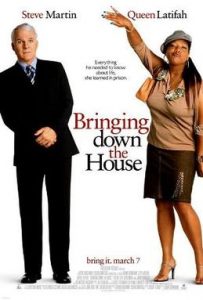 But that year, I wasn’t feeling it. I called her up and suggested a movie instead, fully prepared for her to laugh me off the phone and ask what time I was picking her up for brunch. Instead she readily agreed.
But that year, I wasn’t feeling it. I called her up and suggested a movie instead, fully prepared for her to laugh me off the phone and ask what time I was picking her up for brunch. Instead she readily agreed.
We ended up seeing Bringing Down the House, the silly movie with Queen Latifah and Steve Martin. She laughed so hard during that movie, I remember being glad no one could see us in the darkened theater. She laughed from beginning to end, and all I could do was snicker and shake my head.
Afterward we had a late lunch at Applebees. We ate well and then ordered a dessert we’d normally never get. Some kind of cinnamon crisp, apple something or other that was surprisingly delicious. More laughter, although I can’t recall what on earth we talked about. She was glad we broke “tradition” and didn’t seem to mind that she didn’t get stuff, but laughter and smiles instead.
Two short weeks later, Memorial Day weekend, she was dead. A brain hemorrhage, a result of the clot buster doctors gave her to stop her heart attack, was the culprit.
Shock and devastation inadequately express my emotions at that time, but I remember being so glad we shared that time and laughter, rather than stuff. I was especially glad because my mother and I did not always get along. Especially during my teenage years. There were many ugly moments that I’m sometimes embarrassed or sad to admit we had. I remember being grateful we had the time to work through our shit (because that’s what it was) before she died.
When she first died I tried to whitewash those bad memories – pretend they weren’t as bad as they were. I cursed her. I yelled at her. At times I hated her. But I realized it was wrong to try to wipe that away. It happened. It was us. And we made it through to the other side.
They really made me appreciate our laughter so much more – those ugly years. It’s the totality of our experience together that makes me a better person. A better daughter. And hopefully, when I am so blessed, a better mother.
Thank you mama. I love you. Always and forever.

